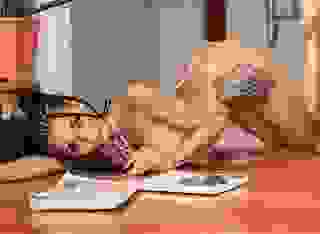- Romance
- Long Holiday
- Page 2
Note: You can change font size, font face, and turn on dark mode by clicking the "A" icon tab in the Story Info Box.
You can temporarily switch back to a Classic Literotica® experience during our ongoing public Beta testing. Please consider leaving feedback on issues you experience or suggest improvements.
Click hereMaureen hugged me. She knew what I was going to say.
"It wasn't the driver's fault. He had a perfect driving record and the truck had been properly maintained. The accident investigators calculated that his speed at the time of first impact with the bollard was no more than fifteen miles an hour, but thirty tonnes of vehicle and load had too much momentum. I was in hospital for four weeks and now I have metal pins in my legs and back. The long term effects limit what I can do but I can work within my capabilities."
"I'm sorry, for you, and for Rita. You loved her, didn't you?"
"Yes. I was working hard to provide a safe and financially secure future for both of us. Her parents were always in some sort of monetary crisis, and Rita was terrified of being like them. When she died I had already paid off the mortgage and had started building a capital reserve. Just knowing we didn't owe money to anyone and could survive a small disaster like a broken washing machine made her happy and relaxed. Of course the insurance payout for her death provided far more money that Rita would ever dreamed of."
Maureen kissed the tear on my cheek.
"But you would have preferred to have her, not the money."
"Yes. We've both been hurt, haven't we, Maureen?"
Her answer was a kiss.
"Back to my idea about your lack of interests," she said when the kiss had ended and we had regained our composure.
"What would I be letting myself in for?" I asked.
"I'd rather leave what I do as a surprise. If you really don't like one activity, you could always back out, and go to the library..."
"...if it's open. But I have to make one proviso. I've seen your car. I'd never get into it, or if I did get in, I'd have to be cut out. I'll use mine, if that's OK with you."
"It's a great little car. I love it."
"I'm sure you do, Maureen. It is economical, easy to park, but it is a little car, and I can't get into little cars. If I could, I might be a poor passenger. I'd re-live that truck crashing into us, and know that in a small car I wouldn't have survived."
"What is your car, Paul?"
"An older Range Rover. It may be old, but it is low mileage and well maintained by the local dealer. If you are going to ride with me, I suggest that you don't wear a pencil skirt. Climbing up into the Range Rover could be difficult or inelegant."
"I don't think I have any pencil skirts. This..." Maureen plucked at her skirt, "is one of my narrowest. I think I could climb into a Range Rover wearing this. What do you think?"
Maureen stood up. She lifted one foot to the bench without straining the hem of her skirt.
"Nice leg," I said. Maureen pretended to slap me. "and I think the skirt would pass the Range Rover test."
"Which reminds me," Maureen said, "I'll have to move my car. Helen left it on a one hour spot. I'll take it home. Could you pick me up at twelve thirty?"
"Yes, Maureen, I could, if I knew where you lived. I don't. Do I need to change to join in your activities?"
"No. You'll do as you are. Where I live?"
Maureen wrote down her address and telephone numbers, including old and new mobiles.
"Use the new mobile number. I'll put the old one on charge as soon as I get home. I know where you live, but not your phone number. I might have had it years ago..."
Her house was less than half a mile from mine, but a railway line ran between them. I would have been unlikely to drive past her house, nor she mine, because they were in quiet roads that led nowhere. I passed her one of my business cards, not the work one I'd never need again, but my private one for people who had needed to contact me when I wasn't at work.
Maureen and I stood up. She hugged me tight and kissed me again. We didn't want to stop.
"I must go," she said breathlessly. "I don't want another parking ticket."
We walked hand in hand out of the park. She climbed into her car and drove off. I walked back to my house to collect the Range Rover. I had time to pick up the post from the hall floor, sort it, reject the advertising and open the few bills. As usual, none were for large sums, mainly for renewals of annual subscriptions that had been running for years. I ought to review them.
Why was I still paying towards organisations that had been Rita's interests, not mine? Inertia, I suppose.
I stopped outside Maureen's house, recognising her car on the drive. She came out of the front door almost as soon as I had stopped and climbed into the Range Rover easily.
"Where to, Madam?" I asked. "Your chauffeur awaits your instructions."
"To the Hall, you know, our local stately home."
"To the Hall it is."
The Hall was about three miles away, including the half-mile long carriage drive. I parked in the visitor's car park which was surprisingly busy for a Monday lunch time. As we walked towards the ticket office I riffled through my card wallet. As I thought, although it wasn't National Trust, but still owned by the original aristocratic family, I had an annual season ticket. I showed it to Maureen.
"A season ticket, Paul? I didn't expect that," she said. "When did you come here last?"
I had to think. I had come with Rita. It must have been more than ten years ago yet I had renewed the season ticket by direct debit every year.
"At least ten years," I replied. "It might have been longer."
"And you kept paying for the season?"
"Yes. When I picked up my post just now I was thinking that I have been paying for many organisations I never contact. This season ticket is one of them."
Maureen's ticket and mine were scanned at the ticket office. She led the way to the restaurant.
"This meal is on me," she announced. "I get a staff discount."
We had what was described as Ploughman's Salad. The quantity and variety of the cheese was generous and the quality was outstanding.
"It's all produced on the Home Farm," Maureen said. "Everything that can be home-grown is. The local Agricultural College provides students who do much of the work except in their summer vacation when other people stay here as working parties. They keep the costs down."
"Why do they need to keep the costs down?" I said, looking at the crowded restaurant and thinking about the number of cars in the car park.
"I don't think they do, Paul, need to economise, that is, but the family are always willing to make money somehow. They always have. That's why they still own this estate and their other large houses."
That started a train of thought. I remembered reading the Guide Book to the Hall that must be filed somewhere in my house, as is a substantial and rare history of the family.
"Why are we here, Maureen?" I dared to ask.
"I'm a volunteer guide, or docent as the Americans would say. I come here about once a month for a couple of hours, sit in one of the rooms that are open to the public, and answer questions if there are any. You'll be joining me this afternoon, in the second guest bedroom."
"Why the second guest bedroom?"
"There's a hierarchy among the guides. Those in the major rooms have history degrees and have published works on an appropriate period. The other important rooms have guides who have lesser qualifications but are here several times a week. The rest of us, like me, are just there to make sure no one touches things they shouldn't and to be able to produce answers that can be found in the Guide Book."
"Which you have read, of course?"
"Yes, from cover to cover, many times. Most of the public just walk through my room quickly. It can be boring. I have read the Guide Book just to keep me from falling asleep."
"Have you read the history of the family? I have a copy at home. It was published in the 1880s, I think."
"You have it?" Maureen was surprised. "There is one copy here, in the library. Anyone reading it has to wear white cotton gloves and handle it with extreme care. They have talked about scanning it, but it is too fragile."
In the second guest bedroom, Maureen was right. It was boring most of the time. There wasn't much to see compared with the principal rooms and most visitors walked through it quickly. We were able to talk quietly, catching up with our activities over the past decade.
A couple stopped to ask about some Chinese vases. Maureen had to answer from the guide's notes on the objects in the room. While she was busy an American couple came in. They walked up to me.
"Excuse me," the man said, "Can you tell me anything about the family connection with Maine?"
"Yes," I replied. "That would be James. You can see his portrait on the main staircase, halfway up. He was a younger son who went to America to look after the family lands there."
"We asked in the other rooms, and no one seemed to know about Maine," the woman said. "Do you know more?"
Maureen had finished explaining the Chinese vases and was standing behind the Americans as I was speaking.
"James was the family representative in America at the time of your War of Independence. He kept a low profile but he did provide money and arms to the Continental Army. His relations here were part of the King's Party, opposed to any concessions to the American Colonists. That was typical of them. They have always had a foot in both camps. They did it with James during the War of Independence. One of his brothers was in Canada so they were on both sides.
They did it during our Civil War. One of them was a Colonel with Cromwell while another was a Cavalier leader of Cavalry for King Charles. Their object is always to preserve the family's fortunes. Whichever side wins, one of the family is with the winners."
"We bought the guide book," the man said, almost accusingly. "There's no mention of James, nor of Maine, nor the American Revolution."
"There wouldn't be," I replied. "You know this estate is still owned by the family?"
"Yes," they said together.
"The Guide Book is a publication produced for the family. It wouldn't include anything controversial. The guides give information based on the Guide Book and other papers provided by the family. Of course all that is favourable to the family and no criticism is allowed."
"So how come you can tell us about James?" He asked.
"I'm not a guide. I'm a visitor, like you, but I'm the guide's friend. I can say things she wouldn't know or couldn't say."
"Thank you. Is there more you can tell us about the American link?
"At the time of the Revolution, James owned considerable parts of Maine. After the success of the Revolution, he still owned those and was able to buy more estates from Tories who had fled to Canada, and his brother could pay them there. James became an American Citizen and his descendants still are. The family still has substantial land holdings in America, including Maine, but they spread Westwards and into Canada as well. This house and the estate are a tiny part of their land holdings in England. They do come here sometimes but treat it as a weekend cottage..."
"Cottage? It's enormous!" The woman spluttered.
"Not by their standards. It only has eight formal bedrooms. One of their other houses, in Derbyshire, has thirty, but that one isn't open to the public."
"Is there anywhere we can find out more?" the man asked.
"Not here. They do have a copy of the family history that I have read, but I understand that it is fragile and not available to read. It was written 'warts and all' by someone who was a distant relation. The family disapproved of it and tried to stop it being published. You might find more information online."
"Thank you, sir," the man said.
He saw Maureen.
"And thank you, ma'am, for having such a knowledgeable friend. We had asked in all the main rooms and your friend has told me more than everyone else."
"Don't forget to look for James on the main staircase," I said as they walked away.
"How did you know so much?" Maureen said mock accusingly. "Surely you didn't remember from reading the family history years ago?"
"I had the family history because I know a couple of the family," I admitted. "They are non-executive directors of my company and I used to meet them several times a month. That's why I bought a copy of the family history, years ago in Charing Cross Road. I thought it might help. It did. Their descendants are just as interested in profits today as their ancestors were then. The only 21st Century change is that they are slightly more considerate of their employees than their ancestors were."
"You know the family?" Maureen was astonished. "Whenever one of them visits here they meet the senior staff briefly, and never acknowledge the lower echelons like me."
"That sounds typical. Servants were always beneath their notice and this place doesn't make much money for them. They were far more interested in the company I worked for because it generated millions of pounds of year for the family."
Maureen and I chatted for the next hour, very rarely interrupted by visitors' questions that Maureen could answer easily. I found out more about her life over the past decade and things I didn't know about her life when Rita was alive. I didn't say much about me. The last ten years of my life had been about work, and any outside interests had been work-related.
One of the other guides came rushing into the room.
"Maureen," she spluttered breathlessly, "You've been summoned to the office urgently. I have to take over from you -- now!"
"Why?" Maureen asked.
"I don't know. They seem to be in some sort of panic and I think they blame you. You'd better hurry."
"I'm coming too," I told Maureen.
We walked at a normal pace to the office. The Director's secretary smiled at Maureen, and pressed the intercom.
"Maureen is here" she announced.
"Send her in," a voice replied.
We walked into the Director's office.
A middle-aged woman was sitting behind a large desk. I recognised the setting. The furniture was designed to intimidate others. Her name, followed by the word 'Director' was on a prominent sign on the centre of the desk. While Maureen took the indicated low chair, I remained standing.
"Who are you?" She asked me bluntly.
"I'm Maureen's friend, and her witness."
"Witness? Why does she need a witness?"
"Because this looks like an interrogation and she might need support."
"Maureen?" She ignored me. "Do you want him here, at a private interview?"
Maureen looked at me. Out of sight of the woman she winked at me.
"Yes. I have no secrets from him."
"Very well. The front desk has made a complaint about you. Apparently you told an American couple derogatory things about the family. You know we aren't allowed to do that..."
"Stop right there!" I said forcefully.
"Why? Why should I take any notice of you?" The woman was irritated.
"Because I was present when the American couple were in the second guest bedchamber. I know exactly what was said to them."
"You do? That makes it worse for Maureen."
"No it doesn't."
"Why not?" The woman was getting exasperated.
"Because Maureen did NOT say a single word to them. I did, Mrs Jenkins."
"Doctor Jenkins!" She hissed back at me.
"Very well, DOCTOR Jenkins. We haven't been introduced."
I rummaged in my credit card wallet and produced a business card that had been made when I visited the German branch of the company. It was almost a joke card. On one side were my titles in German, and on the other an English version. I handed it to her, English side up. It read:
"Herr Professor Professor Doctor Doctor Engineer Paul Arkwright" followed by a long list of letters.
"This is me," I said, "I'm sorry it isn't up-to-date. It should start with three 'Professors'."
I thought she was going to explode. I had outdone her 'Doctor' in spades.
"But..." she started to say.
"But what? I spoke to the Americans, not Maureen. They seemed pleased with the information I gave them. I can't believe that they complained about it."
"They were grateful," Doctor Jenkins admitted reluctantly, "but that breached the conditions of our agreement with the family. We are not allowed to talk about the unfortunate parts of their family history. All our guides know that..."
"Your guide Maureen didn't say a word. She was talking to other visitors at the time. She didn't know what I know. Your agreement with the family doesn't cover what visitors like me might know and say."
"But we could be in trouble with the family. Those Americans wrote a detailed set of remarks in the Visitors' book which would be embarrassing if the family read them."
"There is a simple solution," I said. "I'll send an email to Sir John, telling him what I said, and that I said it, not your guide."
"You'll send an email?" She spluttered. "We don't know his email."
"I do -- his work one and his private one. I met him last week, one of several meetings with him and other members of his family this year. I'm sure he'll see the amusing side. He has no illusions about his family's history."
I thought Doctor Jenkins was about to burst.
"I can't see any point in continuing this discussion," I said. "Maureen did nothing wrong, and you cannot criticise her for something a visitor said."
I held out my hand to Maureen to help out of her low chair. As we walked out of the room Doctor Jenkins looked stunned.
The secretary was smiling broadly as Maureen grabbed me and kissed me passionately.
"That was fabulous," Maureen said. "Doctor Jenkins is the worst part of this place. She runs it like a tyrant. But Herr Professor Professor Arkwright flattened her. Thank you."
"Three 'Professors' please," I retorted.
"Are you really three times a Professor?"
"Yes. Visiting Professor, not full time staff."
"I was asked to record the interview," the secretary said. "I did. I enjoyed it. Doctor Jenkins will probably ask me to delete it, but it is worth sharing. Thank you, Professor Arkwright."
"My pleasure," I replied.
We went to the front desk. The staff looked shaken. We looked at the Americans' comment. As I thought, it was complimentary, but admitted that the family's history had murky patches. What family hasn't?
Maureen and I went to the restaurant for coffee. Her period of duty had expired when she was in the Director's office. The Director's secretary joined us.
"It was time for my break," she said, "and I thought I should let the Director calm down before I go back. She'll be really mad."
"I'm sorry if I've landed you in trouble," I replied, "but Doctor Jenkins was asking for it, and I wasn't going to let Maureen take the blame for something I said."
"I think it would be more interesting," Maureen said, "if we were allowed to be more honest about the family. We present them as saints and they weren't."
"They weren't," the secretary said. "They made their first fortune from the Slave trade. But you'd never know that from the Guide Book."
"They didn't!" Maureen protested.
"They did," I confirmed. "They owned several slave ships and had sugar plantations in the West Indies staffed with slaves. The family history gives details and includes some unpleasant incidents."
"Can I see your business card?" The secretary asked. "That really made the Director mad."
I handed it over.
"It was a joke by my colleagues," I said. "A few Germans make a point of putting their academic titles on business cards, rather like having a wall of certificates in your office. None of the Germans I worked with cared about status, being more interested in cooperation to our mutual benefit. I don't think I ever used that one in Germany."
"But it is impressive," the secretary said as she handed it back. "It made Doctor Jenkins' PhD in Tourism Studies look pathetic."
"But annoying her might end my career as a guide," Maureen said wistfully. "I enjoy it most of the time."
"She can't sack you," the secretary said. "You and I are volunteers, not employees. We are responsible to the Trustees, not to her. The Trustees want more volunteers. We barely have enough, and the Director's attitude to them doesn't help."








